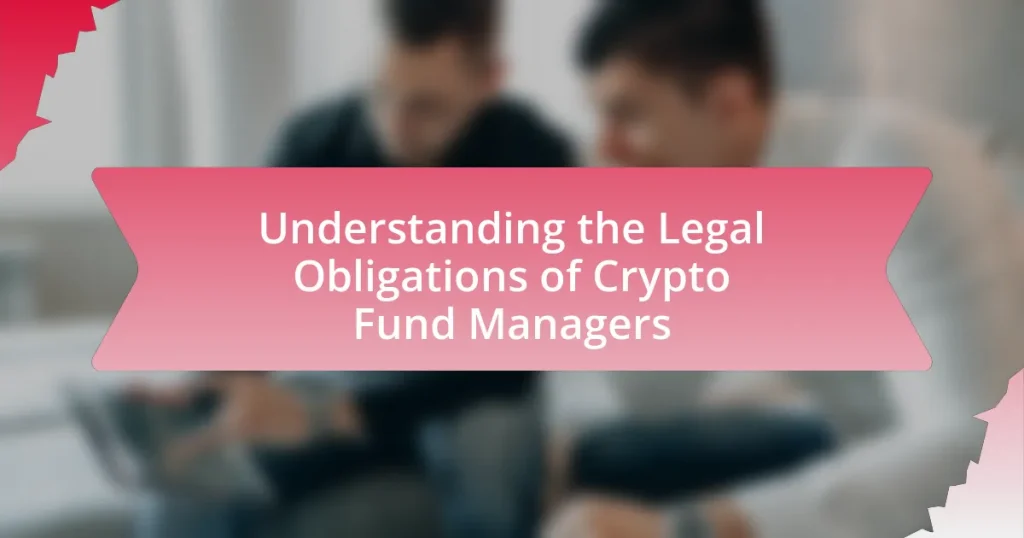The article focuses on the SEC’s regulatory stance regarding crypto investment funds, emphasizing that these funds are subject to the same regulations as traditional investment vehicles under the Investment Company Act of 1940. It outlines how the SEC defines crypto investment funds, the types recognized, and the criteria used for evaluation, highlighting the importance of investor protection and market integrity. The article also discusses the implications of the SEC’s regulations on market stability, innovation, and the challenges faced in regulating the rapidly evolving crypto landscape. Additionally, it provides best practices for compliance with SEC guidelines and resources available for understanding these regulations.
What is the SEC’s Stance on Crypto Investment Funds?
The SEC’s stance on crypto investment funds is that they are subject to the same regulatory framework as traditional investment funds, particularly under the Investment Company Act of 1940. This means that crypto investment funds must register with the SEC unless they qualify for an exemption. The SEC has expressed concerns regarding investor protection, market manipulation, and the potential for fraud in the cryptocurrency space, which influences its regulatory approach. For instance, in 2021, the SEC rejected several Bitcoin ETF proposals, citing concerns over the lack of investor safeguards and the potential for market manipulation.
How does the SEC define crypto investment funds?
The SEC defines crypto investment funds as pooled investment vehicles that primarily invest in cryptocurrencies or related assets. These funds are subject to the same regulatory framework as traditional investment funds, which includes registration requirements and adherence to securities laws. The SEC emphasizes that if a fund offers interests in cryptocurrencies to investors, it must comply with the Investment Company Act of 1940, ensuring investor protection and transparency.
What types of crypto investment funds are recognized by the SEC?
The SEC recognizes several types of crypto investment funds, primarily including registered investment companies, private investment funds, and exchange-traded funds (ETFs) that comply with regulatory standards. Registered investment companies must adhere to the Investment Company Act of 1940, while private investment funds typically operate under exemptions provided by Regulation D. Additionally, the SEC has approved certain ETFs that invest in Bitcoin futures, demonstrating a cautious acceptance of crypto-related investment vehicles. These classifications are based on the SEC’s mandate to protect investors and ensure market integrity.
What criteria does the SEC use to evaluate these funds?
The SEC evaluates crypto investment funds based on criteria such as compliance with securities laws, investor protection, and market integrity. Specifically, the SEC assesses whether the funds are structured to meet regulatory requirements, including registration and disclosure obligations, to ensure transparency and safeguard investors. Additionally, the SEC examines the underlying assets of the funds, their liquidity, and the potential for fraud or manipulation in the market, as outlined in various regulatory frameworks and guidance documents.
Why is the SEC’s stance important for investors?
The SEC’s stance is crucial for investors because it establishes regulatory clarity and protects against fraud in the cryptocurrency market. By providing guidelines and oversight, the SEC helps ensure that investment funds comply with securities laws, which can mitigate risks associated with scams and market manipulation. For instance, the SEC’s enforcement actions against fraudulent schemes have led to the recovery of millions for defrauded investors, demonstrating its role in safeguarding investor interests.
How does the SEC’s regulation impact investor protection?
The SEC’s regulation significantly enhances investor protection by enforcing transparency and accountability among investment funds. By requiring firms to register and disclose financial information, the SEC ensures that investors have access to critical data, which helps them make informed decisions. For instance, the SEC mandates regular reporting of financial performance and risks, which aids in identifying potential fraud or mismanagement. Additionally, the SEC’s enforcement actions against fraudulent schemes serve as a deterrent, further safeguarding investors from potential losses. This regulatory framework is crucial in maintaining market integrity and fostering investor confidence in the financial system.
What risks do investors face without SEC oversight?
Investors face significant risks without SEC oversight, including increased exposure to fraud, lack of transparency, and potential loss of capital. Without the SEC’s regulatory framework, fraudulent schemes can proliferate, as there are fewer mechanisms to verify the legitimacy of investment opportunities. For instance, the SEC reported that in 2021, over $2.8 billion was lost to crypto-related scams, highlighting the vulnerability of investors in an unregulated environment. Additionally, the absence of oversight can lead to inadequate disclosure of risks and financial health of investment funds, making it difficult for investors to make informed decisions. This lack of transparency can result in unexpected losses, as investors may not fully understand the risks associated with their investments.
What are the implications of the SEC’s stance on the crypto market?
The SEC’s stance on the crypto market implies increased regulatory scrutiny and potential limitations on the growth of cryptocurrency investments. This regulatory approach aims to protect investors and ensure market integrity, as evidenced by the SEC’s actions against various crypto firms for non-compliance with securities laws. For instance, in 2021, the SEC initiated enforcement actions against companies like Ripple Labs, asserting that their token sales constituted unregistered securities offerings. Such actions signal to the market that compliance with existing financial regulations is essential, potentially leading to a more cautious investment environment and influencing how crypto projects structure their offerings.
How does the SEC’s position influence market stability?
The SEC’s position significantly influences market stability by establishing regulatory frameworks that govern securities trading and investment practices. By enforcing compliance and transparency, the SEC mitigates risks associated with fraud and market manipulation, which can lead to volatility. For instance, the SEC’s scrutiny of initial coin offerings (ICOs) has led to increased investor confidence, as companies must adhere to strict disclosure requirements, thereby fostering a more stable investment environment. Historical data shows that markets with robust regulatory oversight, such as those influenced by the SEC, tend to experience lower volatility and higher investor participation, reinforcing the importance of the SEC’s role in maintaining market stability.
What effects does SEC regulation have on innovation in the crypto space?
SEC regulation has a significant impact on innovation in the crypto space by imposing compliance requirements that can stifle creativity and limit the development of new projects. The regulatory framework often leads to increased operational costs and legal uncertainties for startups, which may deter investment and slow down the pace of innovation. For instance, the SEC’s classification of certain cryptocurrencies as securities necessitates adherence to stringent reporting and registration processes, which can be burdensome for emerging companies. This regulatory environment has resulted in a cautious approach from developers and investors alike, as seen in the decline of Initial Coin Offerings (ICOs) following increased scrutiny from the SEC. Consequently, while regulation aims to protect investors, it can inadvertently hinder the growth and evolution of innovative technologies within the cryptocurrency sector.
How has the SEC’s stance evolved over time?
The SEC’s stance has evolved from a cautious approach to a more nuanced regulatory framework regarding cryptocurrency investment funds. Initially, the SEC expressed skepticism about cryptocurrencies, emphasizing concerns over fraud and market manipulation, as seen in its 2013 guidance on Bitcoin. Over time, the agency has begun to recognize the potential for innovation within the crypto space, as evidenced by its approval of Bitcoin futures ETFs in 2021. This shift reflects a growing acceptance of digital assets while maintaining a focus on investor protection and regulatory compliance, demonstrated by ongoing enforcement actions against unregistered securities offerings in the crypto sector.
What historical events have shaped the SEC’s approach to crypto investment funds?
The SEC’s approach to crypto investment funds has been significantly shaped by several historical events, including the 2017 Initial Coin Offering (ICO) boom, which led to increased scrutiny and regulatory actions due to rampant fraud and investor losses. The SEC’s 2018 enforcement actions against fraudulent ICOs established a precedent for regulating digital assets under existing securities laws. Additionally, the 2020 publication of the SEC’s Framework for “Investment Contract” Analysis of Digital Assets provided clarity on how the agency would evaluate whether a digital asset is a security. These events collectively influenced the SEC’s regulatory stance, emphasizing investor protection and compliance with securities laws.
How have recent rulings affected the SEC’s regulatory framework?
Recent rulings have significantly impacted the SEC’s regulatory framework by clarifying the agency’s stance on cryptocurrency assets and investment funds. For instance, the SEC’s decision in the Ripple case established that certain digital assets may not be classified as securities, which has led to a reevaluation of how the SEC approaches the regulation of crypto investment funds. This shift is evidenced by the SEC’s increased focus on distinguishing between different types of digital assets and their regulatory requirements, as seen in the agency’s guidance issued in 2023 regarding the classification of tokens. These developments indicate a more nuanced regulatory environment that aims to balance investor protection with innovation in the cryptocurrency space.
What challenges does the SEC face in regulating crypto investment funds?
The SEC faces significant challenges in regulating crypto investment funds due to the rapidly evolving nature of the cryptocurrency market and the lack of clear regulatory frameworks. The decentralized and global nature of cryptocurrencies complicates enforcement, as many projects operate outside traditional financial systems. Additionally, the SEC struggles with classifying cryptocurrencies, which affects how they are regulated under existing securities laws. For instance, the Howey Test, used to determine if an asset is a security, may not adequately apply to many crypto assets, leading to ambiguity. Furthermore, the SEC contends with the proliferation of fraudulent schemes and the need to protect investors while fostering innovation in the crypto space. These factors create a complex regulatory environment that challenges the SEC’s ability to effectively oversee crypto investment funds.
How does the rapidly changing nature of crypto assets complicate regulation?
The rapidly changing nature of crypto assets complicates regulation by creating challenges in establishing consistent legal frameworks. As cryptocurrencies and related technologies evolve, regulators struggle to keep pace with innovations such as decentralized finance (DeFi) and non-fungible tokens (NFTs), which often operate outside traditional financial systems. This rapid evolution leads to ambiguity in defining what constitutes a security, as evidenced by the SEC’s ongoing debates regarding the classification of various crypto assets. Furthermore, the global nature of crypto markets complicates enforcement, as regulations can vary significantly across jurisdictions, making it difficult to implement cohesive regulatory measures.
What are the limitations of the SEC’s current regulatory tools?
The limitations of the SEC’s current regulatory tools include their inability to effectively address the rapid evolution of cryptocurrency markets and the decentralized nature of many crypto assets. The SEC primarily relies on existing securities laws, which may not adequately cover the unique characteristics of cryptocurrencies, leading to regulatory gaps. For instance, the lack of clear guidelines on how certain digital assets should be classified complicates enforcement actions and compliance for market participants. Additionally, the SEC faces challenges in monitoring and regulating decentralized finance (DeFi) platforms, which operate without a central authority, making traditional oversight mechanisms less effective. These limitations hinder the SEC’s capacity to protect investors and maintain market integrity in the fast-paced crypto landscape.
What are the best practices for navigating the SEC’s regulations on crypto investment funds?
The best practices for navigating the SEC’s regulations on crypto investment funds include thorough compliance with registration requirements, understanding the classification of digital assets, and maintaining transparent communication with investors. Compliance with registration is crucial, as the SEC mandates that investment funds dealing in securities must register unless an exemption applies. Understanding the classification of digital assets is essential, as the SEC often categorizes them as securities, which subjects them to specific regulations. Transparent communication with investors helps ensure that all risks are disclosed, aligning with the SEC’s emphasis on investor protection. These practices are supported by the SEC’s guidelines and enforcement actions, which highlight the importance of adhering to regulatory standards in the evolving crypto landscape.
How can investors ensure compliance with SEC guidelines?
Investors can ensure compliance with SEC guidelines by conducting thorough due diligence and adhering to regulatory requirements. This involves understanding the specific rules governing securities offerings, including registration requirements and exemptions, as outlined in the Securities Act of 1933. Investors should also stay informed about the SEC’s interpretations and enforcement actions related to crypto investment funds, as these can impact compliance obligations. For instance, the SEC has emphasized the importance of transparency and accurate disclosures in investment materials, which are critical for maintaining compliance. By regularly consulting legal experts and utilizing compliance tools, investors can effectively navigate the complexities of SEC regulations.
What resources are available for understanding SEC regulations on crypto investments?
The primary resources available for understanding SEC regulations on crypto investments include the SEC’s official website, which provides access to regulatory guidelines, press releases, and public statements. Additionally, the SEC publishes detailed reports and interpretive guidance that clarify its stance on various aspects of cryptocurrency and digital assets. For instance, the SEC’s “Framework for ‘Investment Contract’ Analysis of Digital Assets” offers a comprehensive analysis of how existing securities laws apply to digital assets. Furthermore, legal firms and financial institutions often release white papers and analyses that interpret SEC regulations, providing practical insights for investors. These resources collectively serve as essential tools for comprehending the regulatory landscape surrounding crypto investments.















